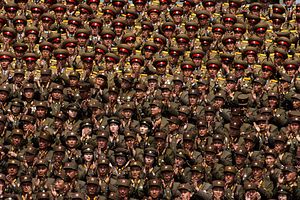North Korea is taking its typical approach to international condemnation, by both lashing out at the West (primarily the U.S.) and reaching out to whichever ally is most readily available (Russia in this instance). It is an old game that has relatively few surprises left, as ballistic missile tests have become old news, and even its nuclear program has had three tests without triggering any kind of military response. While it may seem that Pyongyang has boxed itself into a corner with very few options available, the regime’s ability to sustain itself in spite of near total isolation is its ultimate trump card, as nobody seems have to the ability or willingness to force North Korea’s leadership to face the accusations brought against it.
This latest round of confrontation began on Tuesday with the passage of a UN draft resolution, which recommended that the International Criminal Court take up the issue of North Korean crimes against humanity, evidenced in a UN Commission of Inquiry in February. Pyongyang quickly responded, with a foreign ministry statement on Thursday saying “We completely reject the forceful passage of this resolution, led by the United State with the aim of overthrowing (our) people-centered socialist system.” Its next statement was equally predictable, indicating that U.S. actions “are compelling North Korea not to refrain from an additional nuclear test,” which it last carried out in late 2013.
Prior to the resolution’s passage, Pyongyang began laying the groundwork to ensure that at least one if its erstwhile allies on the UN Security Council will veto it this December. Choe Ryong-hae, now considered to be Kim Jong-un’s number two, traveled to Moscow earlier this week and met with President Vladimir Putin. He will also meet with Foreign Minister Servey Lavrov on Thursday. The reason for his trip is obvious, but it is the tempo with which senior North Korean officials have been visiting Russia and other countries of late that is noteworthy. As both Pyongyang’s isolation from its main ally China has lengthened and the likelihood of the UN General Assembly passing the resolution increased, North Korea has reached out to Russia, South Korea and Japan through high-level meetings. It has also made three high-visibility releases of U.S. prisoners and even offered U.N. officials the right to tour some if its prison facilities. None of these concessions stopped or diluted the resolution.
It does not appear that North Korea is stopping at just public statements condemning the General Assembly’s passage. The blog at 38 North, run by the U.S.-Korea Institute at Johns Hopkins University, reports that satellite imagery suggests that the government is restarting operations at the Yongbyon nuclear complex, with steam seen coming from the re-processing plant, something that has been shut down for almost six years. The reactor itself has been offline for 10 weeks, longer than usual for maintenance, with 38 North estimating that “the North is replacing a small number of spent fuel rods, which may have been defective, and is about to start reprocessing them.”
However, Yonhap News reported Thursday that South Korean Defense Minister Han Min-koo said he “does not expect North Korea to carry out a nuclear test ‘at an early date,’” and while the South’s Joint Chiefs of Staff would not officially comment on 38 North’s findings, an anonymous official said “no specific moves have been detected at the North’s Punggye-ri underground nuclear test site.”
It would appear that the North is withholding definitive action for now, as the Supreme Council’s vote is not immediate and it will seek not to seem overly provocative while attempting to gain assurances from Russia. However, even in the extremely unlikely event of the UNSC passing the case to the ICC, Kim will likely never see the inside of a courtroom short of a complete meltdown in Pyongyang. China has systematically been using its energy and food levers all year, with little effect on the North’s actions beyond prompting it to reach out to other countries. The threat of taking North Korea’s leadership to the ICC is, somewhat counterintuitively, the least effective way to bring them to the negotiating table. As with other vilified and isolated leaders like Muammar Gaddafi or Omar al-Bashir, the prospect of watching their countries crumble around them is often preferable to spending the rest of their lives in jail.

































